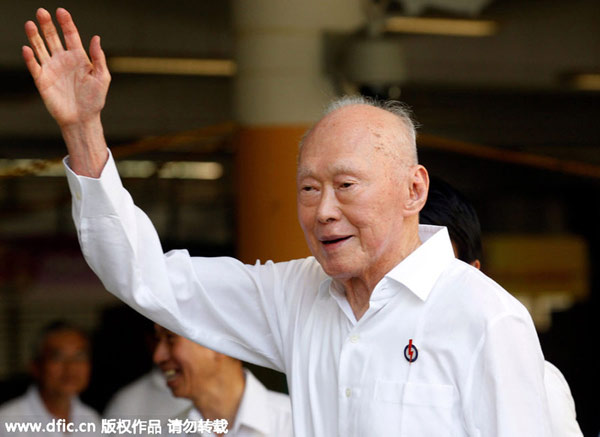 |
|
Former Singapore prime minister Lee Kuan Yew waves to supporters as he submits his nomination papers to contest in the elections in Singapore, April 27, 2011. [Photo/IC] |
Chinese leaders will attend the funeral of former Singaporean Prime Minister Lee Kuan Yew, said Chinese diplomat Hong Lei at Monday's regular press conference.
Chinese President Xi Jinping, Premier Li Keqiang, top legislator Zhang Dejiang, Vice Premier Zhang Gaoli and Foreign Minister Wang Yi respectively expressed their condolences on Monday over the death of Lee.
Lee died on Monday at the age of 91, according to a statement released by the Prime Minister's Office.
"Mr Lee passed away peacefully at the Singapore General Hospital today at 3:18 am," the statement said.
Lee, a Cambridge-educated lawyer, is widely credited with building Singapore into one of the world's wealthiest nations on a per capita basis with a strong, pervasive role for the state and little patience for dissent.
He co-founded the People's Action Party (PAP), which has ruled Singapore since 1959 and led the newly born country when it was separated from Malaysia in 1965.
Singapore's founding father also hailed for diplomatic pragmatism and for inspiring Beijing's reform, opening-up
In Beijing's eyes, Lee Kuan Yew, the late founding father and leader of Singapore, was not only "an old friend of the Chinese people", but also "the founder of China-Singapore relations", according to China's previous official news releases about his visits.
Bilateral, top-level interactions were pioneered by Lee 14 years ahead of the establishment of the two nations' diplomatic relations in 1990.
Chinese media estimated that he had been to China more than 20 times, and he was known for his good personal relations with China's top figures, especially former leader Deng Xiaoping.
Zhang Jiuhuan, the Chinese ambassador to Singapore from 2000 to 2004, noted that "it was a rare case" at the time that a foreign prime minister would visit China, as Lee did in 1976, in the absence of diplomatic relations between the two nations. Deng then paid back the visit, going to Singapore in 1978, in what Zhang described as a sensational trip.
Lee was a man "with thoughts free from orthodoxy", and his pragmatism in diplomacy made Singapore a pioneer among Southeast Asia nations in harvesting large-scale trade, economic cooperation and talent exchanges with China, Zhang said.
However, Lee's intimacy with China since 1976 goes way beyond his remarkable record of handshakes with most of China's top leaders, including Mao Zedong and Deng.
Those who witnessed history unfold, as well as other observers, hailed the Singaporean statesman's efforts in inspiring China's reforms and opening-up.
Jin Canrong, a professor of international relations at Renmin University of China in Beijing, noted that Lee's No 1 contribution to China was his efforts in "sharing Singapore's successful experience in governance", adding that "China has benefited a lot" from this.
The China-Singapore Suzhou Industrial Park, inaugurated in February 1994 in Jiangsu province in East China, was proposed by Lee, who even went to the city in 1992 to inspect the site for the park.
Now, with the park serving as a role model for China's economic cooperation with foreign countries, more such industrial parks hosted or co-hosted by China have been established domestically and abroad.
Additionally, because of Lee's advocacy for sharing his country's inspiring philosophy of governance with China, Singapore has served as a de facto, inspirational training center for visiting Chinese officials.